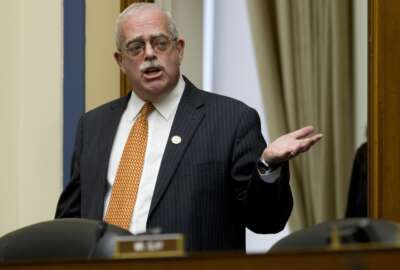
ODNI pushes background investigation reciprocity
In today's Federal Newscast, citing the cost of defending himself against "false" allegations, Interior Secretary Ryan Zinke said he will be stepping down.
To listen to the Federal Newscast on your phone or mobile device, subscribe on PodcastOne or Apple Podcasts. The best listening experience on desktop can be found using Chrome, Firefox or Safari.
- Interior Secretary Ryan Zinke will exit the department at the end of the year. President Donald Trump tweeted the announcement over the weekend. He did not cite a reason, however Zinke himself tweeted he could not justify spending thousands of dollars defending himself and his family against “false allegations.” (Twitter)
- Cuts to the Department of Health and Human Services’ telework program could be coming. HHS and the National Treasury Employees Union have been negotiating with help from a federal mediator. HHS submitted an official proposal to limit telework to one day a week, and make further decisions about the program without informing the union. The Federal Services Impasses Panel had ordered a mediator sit-in for two weeks during negotiations with HHS and NTEU. The proposal isn’t final yet. (National Treasury Employees Union)
- The Office of Management and Budget finally revealed the update to an 11-year-old cyber policy. OMB outlined four possible approaches for how agencies can secure their internet gateways. In a new draft policy for the Trusted Internet Connections (TIC) initiative, OMB charged the Department of Homeland Security with developing uses cases for cloud, for remote users, for nonheadquarter offices and for traditional TIC implementations. Under the proposal, agencies would have a year to migrate to the new TIC requirements. The draft policy replaces one from 2007 that many said was making it more difficult for agencies to move to the cloud. (Office of the Federal Chief Information Officer)
- The Postal Service Office of Inspector General is looking to see how efficiently USPS works. The IG will review five years of service metrics for first-class mail, packages, and other products. Last year, the Postal Service improperly reported 2 billion pieces of late mail as being delivered on time. The OIG expects to release its report next July. (U.S. Postal Service Office of Inspector General)
- USASpending.gov could use some improvements. The Government Accountability Office said the site does not offer machine-readable metadata for agency contracts. GAO also recommended the Treasury Department take steps to disclose the sources of data used on the site. The website breaks down more than $4 trillion in annual agency spending. Treasury is required to give a quarterly overview of agency spending through the site. (Government Accountability Office)
- House and Senate lawmakers gave DHS official marching orders to develop a more comprehensive way to share sensitive data. The DHS Data Framework Act is heading to Trump’s desk after passing both chambers. The bill codifies an effort at DHS to develop a data framework which brings in all component agency data related to homeland security, terrorist information, weapons of mass destruction and national intelligence into one system. The goal is to alleviate the current process of searching and vetting information against multiple databases with different log-ins, passwords, and legal restrictions. (Rep. Will Hurd)
- The Director of National Intelligence is directing all agencies to accept background investigations coming from any authorized adjudicative agency. New guidelines from the ODNI describe how agencies should achieve reciprocity in background investigations and security adjudications. The Federation of American Scientists obtained the new DNI policy, which says agencies should accept most investigations unless the most recent one is more than seven years old. Agencies shouldn’t deny an investigation because a polygraph test hasn’t been completed. (Federation of American Scientists)
- Lowering the defense budget by 5 percent compared to Defense Department-developed, long-term budget plans could save the government more than $250 billion over 10 years. The estimate came from a Congressional Budget Office report, which laid out 121 ways the U.S. can reduce its debt. Another option suggested capping military pay increases, which could save more than $17 billion over 10 years. (Congressional Budget Office)
- Basic Housing Allowance for active duty service members will increase by 2.5 percent in 2019. DoD decided to increase the allowance after studying more than 300 military housing areas across the U.S. The agency will end up paying service members a total of $21 billion to subsidize their housing next year. (Department of Defense)
Copyright © 2025 Federal News Network. All rights reserved. This website is not intended for users located within the European Economic Area.
Eric White
Eric White is news anchor and Federal Drive producer at Federal News Network.
Follow @FEDERALNEWSCAST
Related Stories

Agencies made ‘significant progress’ on insider threat, but space is constantly evolving, ODNI says
Related Topics
Acquisition
Agency Oversight
All News
Contracting
Cybersecurity
Defense
Defense News
defense spending
Department of Health and Human Services
Department of Homeland Security
Digital Government
Donald Trump
Federal Drive
Federal Newscast
Government Accountability Office
Interior Department
Management
military housing
National Treasury Employees Union
Office of Management and Budget
Office of the Director of National Intelligence
People
Postal Service
Ryan Zinke
Security clearances
Technology
Trusted Internet Connections
Unions
USASpending.gov
Workforce




